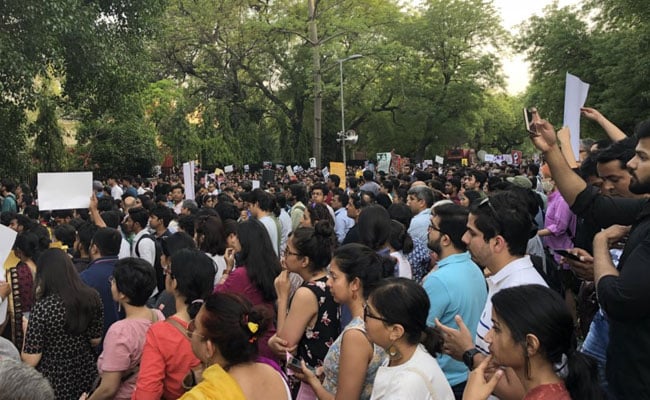
The two rape cases in Jammu's Kathua and Uttar Pradesh's Unnao have sparked nationwide anger. (File)
New Delhi:
Scrambling to assuage the nationwide outrage over sexual violence against young girls, the government is expected to clear an ordinance, or emergency executive order, to bring in death penalty for child rape. Prime Minister Narendra Modi, who returns from a five-day foreign trip, has called for a cabinet meeting today to change the law.
Two cases of rape in Jammu's Kathua and Uttar Pradesh's Unnao have provoked the biggest displays of public anger since the 2012 gang rape and murder of a young woman in the national capital.
Much of the anger was targeted against leaders of the ruling BJP who were seen to be protecting the rapists in both cases. It was amid this public anger that Union Minister Maneka Gandhi last week put out a video message that spoke about her intention to request the Cabinet to introduce death penalty for people guilty of raping children below 12 years.
Prime Minister Narendra Modi also got called out by the International Monetary Fund chief Christine Lagarde on Thursday. She called the gang rape and murder of the eight-year-old girl in Kathua "revolting" and hoped "Indian authorities, starting with Prime Minister Modi pay more attention" to the condition of women.
The barrage of criticism is seen to have contributed to the decision to take the proposal to change in the law to the Union Cabinet. Just a few months back, the NDA government had blocked suggestions to introduce death penalty for a minor's rape during a hearing at the Supreme Court.
"The death penalty is not the answer to everything," the government's law officer PS Narasimha had told the court in January this year.
Existing provisions stipulate a minimum jail term of seven years for a minor's rape. The maximum punishment is a jail term for the remainder of the convict's life.
 A police officer said he wasn't sure how this change to the Protection of Children from Sexual Offences Act 2012, enacted by parliament as an overhaul of the country's rape laws, would help.
A police officer said he wasn't sure how this change to the Protection of Children from Sexual Offences Act 2012, enacted by parliament as an overhaul of the country's rape laws, would help.
Experts have long argued that certainty of punishment, not harsher sentences, were a deterrent to crimes.
According to statistics compiled by the crime records bureau, the courts convict only 3-4 out of every 10 men charged with child rape. The rest are back on the streets, sooner or later.
But fixing the country's criminal justice system requires such an effort, money and time that successive governments opt for band aid solutions, the officer said.
Two cases of rape in Jammu's Kathua and Uttar Pradesh's Unnao have provoked the biggest displays of public anger since the 2012 gang rape and murder of a young woman in the national capital.
Much of the anger was targeted against leaders of the ruling BJP who were seen to be protecting the rapists in both cases. It was amid this public anger that Union Minister Maneka Gandhi last week put out a video message that spoke about her intention to request the Cabinet to introduce death penalty for people guilty of raping children below 12 years.
Prime Minister Narendra Modi also got called out by the International Monetary Fund chief Christine Lagarde on Thursday. She called the gang rape and murder of the eight-year-old girl in Kathua "revolting" and hoped "Indian authorities, starting with Prime Minister Modi pay more attention" to the condition of women.
The barrage of criticism is seen to have contributed to the decision to take the proposal to change in the law to the Union Cabinet. Just a few months back, the NDA government had blocked suggestions to introduce death penalty for a minor's rape during a hearing at the Supreme Court.
"The death penalty is not the answer to everything," the government's law officer PS Narasimha had told the court in January this year.
Existing provisions stipulate a minimum jail term of seven years for a minor's rape. The maximum punishment is a jail term for the remainder of the convict's life.

Protests at Delhi's Parliament Street over Kathua, Unnao rape cases
Experts have long argued that certainty of punishment, not harsher sentences, were a deterrent to crimes.
According to statistics compiled by the crime records bureau, the courts convict only 3-4 out of every 10 men charged with child rape. The rest are back on the streets, sooner or later.
But fixing the country's criminal justice system requires such an effort, money and time that successive governments opt for band aid solutions, the officer said.
Track Latest News Live on NDTV.com and get news updates from India and around the world

